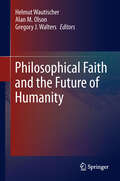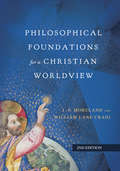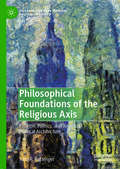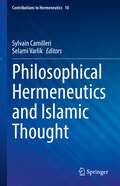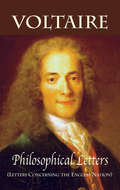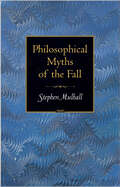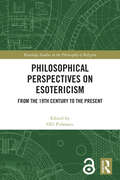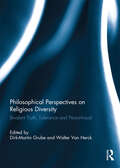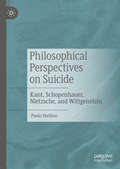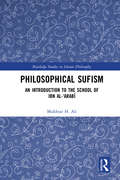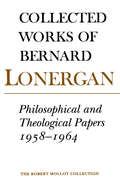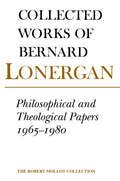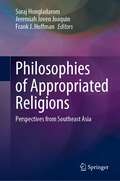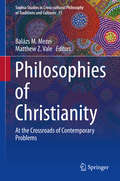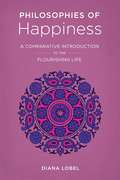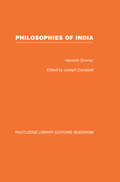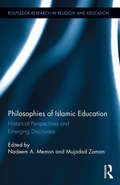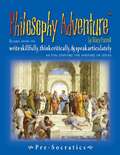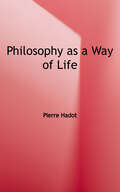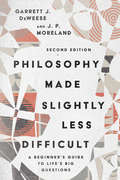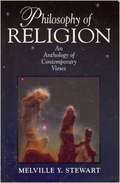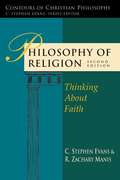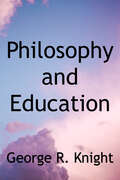- Table View
- List View
Philosophical Faith and the Future of Humanity
by Helmut Wautischer Alan M. Olson Gregory J. WaltersKarl Jaspers, who died in 1969, had a profound impact on 20th-century theology and philosophy. His central thesis called for, among other things, a de-centering of philosophy from its Eurocentric roots and a renewal of its dialogue with other traditions, especially Asian ones. This collection of essays includes unpublished work by Jaspers himself as well as testimonies to his life and career by colleagues, associates, and translators, some of who knew Jaspers personally. Readers will also find commentary and interpretation by researchers who have explored Jaspers' work for decades, and a biographical account of Jaspers' student Leonard Ehrlich, who handled much of Jaspers' English translation. The book interrogates Jaspers' conceptions of 'philosophical faith', his philosophy of communication, and the prospects for world philosophy in the future. Focusing on philosophical faith, it assesses Jaspers' interpretations of key philosophers such as Kant, Hegel, Schelling, Kierkegaard, Nietzsche, and Rosenzweig, as well as examining his personal relationships with Bultmann and Heidegger. Contributors also look at Jaspers' philosophies of religion and history, his hypothesis of the 'axial age' (Achsenzeit), and his contributions to metaphysics, periechontology, and economics. Finally, chapters cover Jaspers' philosophy of communication and world history. The latter are informed by a burgeoning interest in Kantian 'Freiheitphilosophie' that influenced Jaspers, as well as concerns over the future of humanity. These concerns in part account for Jaspers' growing popularity in the Middle East, Eastern Europe, Central/South America, and Asia. Also included are lucid clarifications of the difference between religious and philosophical faith, and the relevance of certainty, trust, and communication for a future of mankind. Trained as a psychiatrist, Jaspers practiced this profession before becoming a philosopher and thus had a keen insight into the workings of the human mind even as he challenged the philosophical establishment of his time. It is perhaps this depth to his background that adds to the contemporary relevance of his work.
Philosophical Foundations for a Christian Worldview
by J. P. Moreland William Lane CraigNow updated and expanded in this second edition, Philosophical Foundations for a Christian Worldview by J. P. Moreland and William Lane Craig offers a comprehensive introduction to philosophy from a Christian perspective. In their broad sweep they seek to introduce readers to the principal subdisciplines of philosophy, including epistemology, metaphysics, philosophy of science, ethics, and philosophy of religion. They do so with characteristic clarity and incisiveness. Arguments are clearly outlined, and rival theories are presented with fairness and accuracy. Philosophy, they contend, aids Christians in the tasks of apologetics, polemics, and systematic theology. It reflects our having been made in the image of God, helps us to extend biblical teaching into areas not expressly addressed in Scripture, facilitates the spiritual discipline of study, enhances the boldness and self-image of the Christian community, and is requisite to the essential task of integrating faith and learning. Here is a lively and thorough introduction to philosophy for all who want to know reality. This second edition now includes including enhanced arguments, updated bibliographies, and new chapters on atonement and the mind-body problem.
Philosophical Foundations of the Religious Axis: Religion, Politics, and American Political Architecture (Palgrave Studies in Religion, Politics, and Policy)
by John R. PottengerThis book discusses the evolution of three philosophical foundations from the twelfth through the eighteenth centuries that converged to form the basis of liberal democracy’s approach to the place and role of religion in society and politics. Identified by the author as a “religious axis,” the period of convergence promoted rational and empirical investigation, enabled the development of diverse religious beliefs, and affirmed religious liberty and expressions amidst pluralist politics. The author shows that the religious axis’ three philosophical foundations—epistemic, axiological, and political—undergird the political architecture of American liberal democracy that designed a containment structure to protect a vast array of religious expressions and encourage their presence in the public square. Moreover, the structure embodied a democratic ethos that drives religious and political pluralism—but within limits. The author argues that this containment structure has paradoxically ignited frenzied fires of faith that politically threaten the structure’s own limits.
Philosophical Hermeneutics and Islamic Thought (Contributions to Hermeneutics #10)
by Sylvain Camilleri Selami VarlikThis book investigates the methodological issues raised by the encounter between Islamic thought and contemporary philosophical hermeneutics. It features essays that examine why and how current Muslim thinkers refer to Continental philosophy. The contributors put the universality of the hermeneutic order to the test with three different approaches. The first looks at exegetical aspects. It addresses contemporary thinkers from the Islamicate world who have engaged critically or not with main representatives or key concepts of philosophical hermeneutics. The second presents an interpretative analysis. The essays here present attempts at using philosophical hermeneutics in order to develop new interpretations of canonical or traditional ensembles of texts such as the Qur’an and the Hadith as well as legal, spiritual, and philosophical corpuses from the Islamicate world. The third looks at different political and critical issues. The clear and sound reference to religion of Islamic thought makes its entanglement with philosophical hermeneutics a burning challenge for all parties involved. Is it true, as some contend, that philosophical hermeneutics can help interpret Islamic thought anew? This book reveals how the two philosophies are likely to expand each other’s horizons and influence each other’s conceptual frameworks. It features revised papers from an International Conference.
Philosophical Letters: Letters Concerning the English Nation (Thrift Edition Ser.)
by VoltaireBest known for his philosophical novel Candide, Voltaire ranked among the leading intellectuals of the Enlightenment period. His two-and-a-half-year sojourn in England left a profound impression, and these letters—written as though explaining English society to a French friend—focus on the country's religion and politics, with commentaries on Quakers, the Church of England, Presbyterians, Anti-Trinitarians, Parliament, the government, and commerce. They also include essays on Locke, Descartes, and Newton. Voltaire was much influenced by English tolerance, and his observations on the subject sounded a revolutionary note among European readers that resonated for long afterward. First published in English in 1733, Philosophical Letters was condemned by the French government as "likely to inspire a license of thought most dangerous to religion and civil order." It remains a landmark of the Age of Reason.
Philosophical Myths of the Fall (Princeton Monographs in Philosophy #18)
by Stephen MulhallDid post-Enlightenment philosophers reject the idea of original sin and hence the view that life is a quest for redemption from it? In Philosophical Myths of the Fall, Stephen Mulhall identifies and evaluates a surprising ethical-religious dimension in the work of three highly influential philosophers--Nietzsche, Heidegger, and Wittgenstein. He asks: Is the Christian idea of humanity as structurally flawed something that these three thinkers aim simply to criticize? Or do they, rather, end up by reproducing secular variants of the same mythology? Mulhall argues that each, in different ways, develops a conception of human beings as in need of redemption: in their work, we appear to be not so much capable of or prone to error and fantasy, but instead structurally perverse, living in untruth. In this respect, their work is more closely aligned to the Christian perspective than to the mainstream of the Enlightenment. However, all three thinkers explicitly reject any religious understanding of human perversity; indeed, they regard the very understanding of human beings as originally sinful as central to that from which we must be redeemed. And yet each also reproduces central elements of that understanding in his own thinking; each recounts his own myth of our Fall, and holds out his own image of redemption. The book concludes by asking whether this indebtedness to religion brings these philosophers' thinking closer to, or instead forces it further away from, the truth of the human condition.
Philosophical Perspectives on Esotericism: From the 19th Century to the Present (Routledge Studies in the Philosophy of Religion)
by Pitkänen, Edited by OlliThis volume offers the first systematic philosophical study of esotericism and late modern philosophy. It addresses fundamental philosophical questions related to esotericism and reveals that esoteric ideas have had decisive impact on countless important philosophers, even if this fact has been neglected in contemporary philosophy.The first part of the book is dedicated to substantial and methodological questions. What is philosophy, what is esotericism, and how should we think about their relationship? The second section is more historically oriented, and it is divided in two parts. Part I is concerned with German romanticism and idealism, with a specific focus on the influence of esotericism on Hegel and Schelling, as well as the connection between romanticism and Kabbalah in the work of Gershom Scholem. Part II explores esotericism in phenomenology, pragmatism, and post-idealism, specifically in the work of William James, Martin Heidegger, Henri Bergson, and Roy Bhaskar.Philosophical Perspectives on Esotericism will appeal to scholars and advanced students working in philosophy of religion, history of philosophy, and religious studies.
Philosophical Perspectives on Religious Diversity: Bivalent Truth, Tolerance and Personhood
by Dirk-Martin Grube and Walter Van HerckAddressing the question of what kind of theoretical foundations are required if we wish to have a constructive attitude towards different religions, this book scrutinizes aspects of the human condition, personhood and notions of (exclusive) truth and tolerance.In the book, Wolterstorff suggests that persons have hermeneutic and related competences that account for their special dignity, and that this dignity implies the right to practice religion freely. Margolis emphasizes the contingent character of all religious pursuits – being products of a unique form of evolution, humans need to create convincing purposes in an otherwise purposeless world. Respondents criticize both views with an eye on the question of whether those views promote religious tolerance.Grube criticizes the tendency for interreligious dialogue to be pursued under the parameters of an exclusive, bivalent notion of truth according to which something is necessarily false if it is not true. Under those parameters, religions that differ from the (one) true religion must be false. This explains why religious pluralists attempt to minimize the differences between religions at all costs and why others suggest implausibly strong concepts of tolerance. As an alternative, Grube proposes to drop exclusive concepts of truth and to conduct interreligious dialogue under the parameters of the concept of justification which allows for pluralisation. The following discussion takes up this criticism of bivalence and its consequences for dealing with religious otherness. This book was originally published as a special issue of the International Journal of Philosophy and Theology.
Philosophical Perspectives on Suicide: Kant, Schopenhauer, Nietzsche, and Wittgenstein
by Paolo StellinoThis book aims to address in a novel way some of the fundamental philosophical questions concerning suicide. Focusing on four major authors of Western philosophy - Kant, Schopenhauer, Nietzsche, and Wittgenstein - their arguments in favour or against suicide are explained, contextualized, examined and critically assessed. Taken together, these four perspectives provide an illuminating overview of the philosophical arguments that can be used for or against one’s right to commit suicide. Intended both for specialists and those interested in understanding the many complexities underlying the philosophical debate on suicide, this book combines philosophical depth with exemplary clarity.
Philosophical Religions from Plato to Spinoza
by Carlos FraenkelMany pagan, Jewish, Christian and Muslim philosophers from Antiquity to the Enlightenment made no meaningful distinction between philosophy and religion. Instead they advocated a philosophical religion, arguing that God is Reason and that the historical forms of a religious tradition serve as philosophy's handmaid to promote the life of reason among non-philosophers. Carlos Fraenkel provides the first account of this concept and traces its history back to Plato. He shows how Jews and Christians appropriated it in Antiquity, follows it through the Middle Ages in both Islamic and Jewish forms and argues that it underlies Spinoza's interpretation of Christianity. The main challenge to a philosophical religion comes from the modern view that all human beings are equally able to order their lives rationally and hence need no guidance from religion. Fraenkel's wide-ranging book will appeal to anyone interested in how philosophy has interacted with Jewish, Christian, and Muslim religious traditions.
Philosophical Sufism: An Introduction to the School of Ibn al-'Arabi (Routledge Studies in Islamic Philosophy)
by Mukhtar H. AliAnalyzing the intersection between Sufism and philosophy, this volume is a sweeping examination of the mystical philosophy of Muḥyī-l-Dīn Ibn al-ʿArabī (d. 637/1240), one of the most influential and original thinkers of the Islamic world. This book systematically covers Ibn al-ʿArabī’s ontology, theology, epistemology, teleology, spiritual anthropology and eschatology. While philosophy uses deductive reasoning to discover the fundamental nature of existence and Sufism relies on spiritual experience, it was not until the school of Ibn al-ʿArabī that philosophy and Sufism converged into a single framework by elaborating spiritual doctrines in precise philosophical language. Contextualizing the historical development of Ibn al-ʿArabī’s school, the work draws from the earliest commentators of Ibn al-ʿArabī’s oeuvre, Ṣadr al-Dīn al-Qūnawī (d. 673/1274), ʿAbd al-Razzāq al-Kāshānī (d. ca. 730/1330) and Dawūd al-Qayṣarī (d. 751/1350), but also draws from the medieval heirs of his doctrines Sayyid Ḥaydar Āmulī (d. 787/1385), the pivotal intellectual and mystical figure of Persia who recast philosophical Sufism within the framework of Twelver Shīʿism and ʿAbd al-Raḥmān Jāmī (d. 898/1492), the key figure in the dissemination of Ibn al-ʿArabī’s ideas in the Persianate world as well as the Ottoman Empire, India, China and East Asia via Central Asia. Lucidly written and comprehensive in scope, with careful treatments of the key authors, Philosophical Sufism is a highly accessible introductory text for students and researchers interested in Islam, philosophy, religion and the Middle East.
Philosophical and Theological Papers, 1958-1964: Volume 6
by Bernard Lonergan Robert Doran, S.J. Frederick Crowe, S.J. Robert CrokenThe period during which Bernard Lonergan delivered the eleven lectures in this volume was one of important transition for him: he was moving rapidly toward a new conception of theology and its method; and he was on the verge of what is now recognized as a major breakthrough in his thought on method, the idea that came to him in February 1965 of the eight functional specialities. While the lectures maintain a continuity with Lonergan's previous work, they also reveal new and significant ideas, especially in regard to his drive toward a new conception of theology as a whole, and his particular concern for the relevance of theology to the spiritual life. The lectures here include 'The Redemption,' 'Method in Catholic Theology,' 'The Philosophy of History,' 'The Origins of Christian Realism,' `Time and Meaning,' 'Consciousness and the Trinity,' `Exegesis and Dogma,' 'The Mediation of Christ in Prayer,' 'The Analogy of Meaning,' 'Philosophical Positions with Regard to Knowing,' and 'Theology as Christian Phenomenon.' This volume provides a key to understanding the development of Lonergan's philosophical and theological thought, his major influences, and the pivotal moments of transition in the road leading up to Method in Theology and beyond.
Philosophical and Theological Papers, 1965-1980: Volume 17
by Bernard Lonergan Robert Doran, S.J. Robert CrokenA companion to Philosophical and Theological Papers 1958-1964 (Volume 6 in the Collected Works of Bernard Lonergan series), this anthology contains Lonergan's lectures on philosophy and theology given during the later period of his life, 1965-1980. These papers document his development in the discipline during the years leading up to the publication of Method in Theology, and beyond to 1980 when he was more engaged in his writings and seminars on macroeconomics. Philosophical and Theological Papers 1965-1980 is divided into five sections, forming units on the basis of dates. The three central sections are each a set of lectures respectively given at the Massachusetts Institute of Technology, Gonzaga University in Spokane, and Trinity College (University of Toronto). Although there is some repetition amongst the lecture sets and in relation to other more familiar works, this repetition displays occasional new turns of phrase that the careful reader will note. In at least one instance, familiar material suddenly opens out onto expressions not to be found anywhere else in Lonergan's work. Other very interesting developments regard the movement from speaking of the immutability of dogmas to their permanence of meaning and the permutations among 'real self-transcendence,' 'performative self-transcendence,' and 'moral self-transcendence.'
Philosophies of Appropriated Religions: Perspectives from Southeast Asia
by Soraj Hongladarom Jeremiah Joven Joaquin Frank J. HoffmanThis book brings together different intercultural philosophical points of view discussing the philosophical impact of what we call the ‘appropriated’ religions of Southeast Asia. Southeast Asia is home to most of the world religions. Buddhism is predominantly practiced in Thailand, Vietnam, Myanmar, Singapore, Laos, and Cambodia; Islam in Malaysia, Indonesia, and Brunei; and Christianity in the Philippines and Timor-Leste. Historical data show, however, that these world religions are imported cultural products, and have been reimagined, assimilated, and appropriated by the culture that embraced them. In this collection, we see that these ‘appropriated’ religions imply a culturally nuanced worldview, which, in turn, impacts how the traditional problems in the philosophy of religion are framed and answered—in particular, questions about the existence and nature of the divine, the problem of evil, and the nature of life after death. Themes explored include: religious belief and digital transition, Theravāda Buddhist philosophy, religious diversity, Buddhism and omniscience, indigenous belief systems, divine apology and unmerited human suffering, dialetheism and the problem of evil, Buddhist philosophy and Spinoza’s views on death and immortality, belief and everyday realities in the Philippines, comparative religious philosophy, gendering the Hindu concept of dharma, Christian devotion and salvation during the Spanish colonial period in the Philippines through the writings of Jose Rizal, indigenous Islamic practices in the Philippines, practiced traditions in contemporary Filipino celebrations of Christmas, role of place-aspects in the appropriation of religions in Southeast Asia, and fate and divine omniscience. This book is of interest to scholars and researchers of philosophy of religion, sociology of religion, anthropology of religion, cultural studies, comparative religion, religious studies, and Asian studies.
Philosophies of Christianity: At the Crossroads of Contemporary Problems (Sophia Studies in Cross-cultural Philosophy of Traditions and Cultures #31)
by Balázs M. Mezei Matthew Z. ValeThis book examines key issues in Christianity from various philosophical points of view. It brings together European authors with American theologians and philosophers on an interconfessional basis. Coverage combines analytical and continental approaches in a unique way. This comprehensive, innovative analysis will help readers gain a deep understanding into a wide range of philosophical approaches to basic Christian problems. The novelty of this volume is the unique combination of philosophical and theological approaches. It merges these points-of-view in a rational manner which characterizes segments of Anglo-American and Continental thought. The scope of the work covers historical issues, contemporary problems of atheism, and also novel approaches to fundamental notions. Readers will learn about questions surrounding the French New Theology, Zizek’s philosophical sources, the notion of revelation, and much more. As a work produced by European and United States scholars, this volume is an important contribution not only to the dialogue between various academic cultures, but also to the expression of their fruitful cooperation which grounds and inspires serious academic research. The readership of this work begins at an undergraduate level and reaches up to academic researchers and professors interested in borderline problems between philosophy and theology, history and contemporary issues.
Philosophies of Happiness: A Comparative Introduction to the Flourishing Life
by Diana LobelWhat does it mean to be truly happy? In Philosophies of Happiness, Diana Lobel provides a rich spectrum of arguments for a theory of happiness as flourishing or well-being, offering a global, cross-cultural, and interdisciplinary perspective on how to create a vital, fulfilling, and significant life. Drawing upon perspectives from a broad range of philosophical traditions—Eastern and Western, ancient and contemporary—the book suggests that just as physical health is the well-being of the body, happiness is the healthy and flourishing condition of the whole human being, and we experience the most complete happiness when we realize our potential through creative engagement.Lobel shows that while thick descriptions of happiness differ widely in texture and detail, certain themes resonate across texts from different traditions and historical contexts, suggesting core features of a happy life: attentive awareness; effortless action; relationship and connection to a larger, interconnected community; love or devotion; and creative engagement. Each feature adds meaning, significance, and value, so that we can craft lives of worth and purpose. These themes emerge from careful study of philosophical and religious texts and traditions: the Greek philosophers Aristotle and Epicurus; the Chinese traditions of Confucius, Laozi, and Zhuangzi; the Hindu Bhagavad Gītā; the Japanese Buddhist tradition of Soto Zen master Dōgen and his modern expositor Shunryu Suzuki; the Western religious traditions of Augustine and Maimonides; the Persian Sufi tale Conference of the Birds; and contemporary research on mindfulness and creativity. Written in a clear, accessible style, Philosophies of Happiness invites readers of all backgrounds to explore and engage with religious and philosophical conceptions of what makes life meaningful.Visit https://cup.columbia.edu/extras/supplement/philosophies-of-happiness for additional appendixes and supplemental notes.
Philosophies of India (Routledge Library Editions: Buddhism #9)
by Heinrich ZimmerOriginally published in 1973. The volume is divided into four sections: The introduction places the position of the Buddhist Tantras within Mahayana Buddhism and recalls their early literary history, especially the Guhyasamahatantra; the section also covers Buddhist Genesis and the Tantric tradition. The foundations of the Buddhist Tantras are discussed and the Tantric presentation of divinity; the preparation of disciples and the meaning of initiation; symbolism of the mandala-palace Tantric ritual and the twilight language. This section explores the Tantric teachings of the inner Zodiac and the fivefold ritual symbolism of passion. The bibliographical research contains an analysis of the Tantric section of the Kanjur exegesis and a selected Western Bibliography of the Buddhist Tantras with comments.
Philosophies of Islamic Education: Historical Perspectives and Emerging Discourses (Routledge Research in Religion and Education #4)
by Mujadad Zaman Nadeem A. MemonThe study of Islamic education has hitherto remained a tangential inquiry in the broader focus of Islamic Studies. In the wake of this neglect, a renaissance of sorts has occurred in recent years, reconfiguring the importance of Islam’s attitudes to knowledge, learning and education as paramount in the study and appreciation of Islamic civilization. Philosophies of Islamic Education, stands in tandem to this call and takes a pioneering step in establishing the importance of its study for the educationalist, academic and student alike. Broken into four sections, it deals with theological, pedagogic, institutional and contemporary issues reflecting the diverse and often competing notions and practices of Islamic education. As a unique international collaboration bringing into conversation theologians, historians, philosophers, teachers and sociologists of education Philosophies of Islamic Education intends to provide fresh means for conversing with contemporary debates in ethics, secularization theory, child psychology, multiculturalism, interfaith dialogue and moral education. In doing so, it hopes to offer an important and timely contribution to educational studies as well as give new insight for academia in terms of conceiving learning and education.
Philosophy Adventure: Pre-Socratics
by Stacy FarrellPhilosophy AdventureTM is a program designed to help students 6th-12th grade cultivate and defend a biblical worldview by teaching them how to write skillfully, think critically, and speak articulately as they explore the history of philosophy. Engaging Easy to use Empowering!
Philosophy As a Way of Life: Spiritual Exercises from Socrates to Foucault
by Pierre HadotThis book presents a history of spiritual exercises from Socrates to early Christianity, an account of their decline in modern philosophy, and a discussion of the different conceptions of philosophy that have accompanied the trajectory and fate of the theory and practice of spiritual exercises. Hadot's book demonstrates the extent to which philosophy has been, and still is, above all else a way of seeing and of being in the world.
Philosophy Made Slightly Less Difficult: A Beginner's Guide to Life's Big Questions
by J. P. Moreland Garrett J. DeWeeseWhat is real?How do we know what we know?What is the right thing to do?What does it mean to be human?How should we view science and its claims?Why should we believe that God exists?
Philosophy Of Judaism
by Joshua AdlerA survey of the sociological and cultural aspects of Judaism in society today.
Philosophy Of Religion: An Anthology Of Contemporary Views (Philosophy)
by Melville Y. StewartThis volume contains primarily recent essays in philosophy of religion, representing the analytic and continental traditions of the West. A total of 36 authors from varying Christian traditions, and several from the atheistic orientation have contributed to a total of 42 essays. Nearly half of the essays are unique to this anthology.
Philosophy Of Religion: Thinking About Faith
by C. Stephen Evans R. Zachary ManisWith over 40,000 copies in print since its original publication in 1982, Steve Evans's Philosophy of Religion has served many generations of students as a classic introduction to the philosophy of religion from a Christian perspective. Over the years the philosophical landscape has changed, and in this new edition Zach Manis joins Evans in a thorough revamping of arguments and information, while maintaining the qualities of clarity and brevity that made the first edition so appreciated. New material on divine foreknowledge and human freedom has been added as well as on Reformed epistemology. The discussions on science now cover new developments from cognitive psychology and naturalism as well as on the fine-tuning of the cosmos. The chapter on faith and reason has been expanded to include consideration of evidentialism. The problem of evil now forms its own new chapter and adds a discussion of the problem of hell. The standard features remain: a survey of the field, an examination of classical arguments for God's existence, and an exploration of contemporary challenges to theism from the social sciences and philosophy as well as the natural sciences. The meaning and significance of personal religious experience, revelation and miracles--all within the realm of contemporary religious pluralism--are likewise investigated. A classic introduction thoroughly updated and refreshed for today's student.
Philosophy and Education: An Introduction in Christian Perspective
by George R. KnightThis book has been a classic in its field for more than a quarter of a century. New features of this revised and updated fourth edition make it of even greater usefulness in the educational philosophy classrooms of a new century. These include an all-new chapter on the Christian teacher in the public school setting; "Points to Ponder" study questions at the end of each chapter; new material addressing the latest relevant issues, including the rise of the home school movement, and the relation of the Intelligent Design debate to Christian educational philosophy; a fresh, new text design, including call-out highlights of major themes; and an updated bibliography and references.
